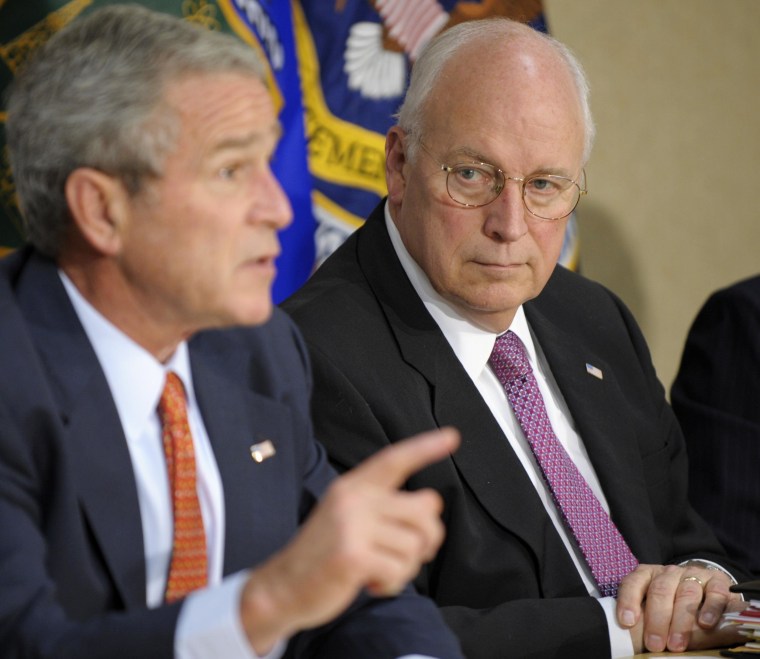The Bushies are back.
With the news that a militant Islamic group has seized parts of Iraq, key members of former President George W. Bush’s nationalsecurity team who served as architects of the 2003 war there have reappeared -- to either criticize the Obama administration or advocate for another round of intervention in the country.
"The policies of the last six years have left American diminished and weakened. Our enemies no longer fear us. Our allies no longer trust us," former Vice President Cheney says in a new video.
Additionally, he and his daughter, Liz Cheney, penned a Wall Street Journal op-ed, arguing: "Rarely has a U.S. president been so wrong about so much at the expense of so many."
And it's just not the Cheneys.
Former Bush Deputy Defense Secretary Paul Wolfowitz said on MSNBC Tuesday that the United States has an obligation to stop what he said is an Al Qaeda-linked group. "This is about preventing another 9/11."
And Paul Bremer, the Bush administration's envoy to Iraq, said that the U.S. might need troops on the ground in Iraq. “I’m not in favor of sending combat forces into Iraq at the moment,” he said on Monday. “But I can well imagine that we would have to have some troops on the ground.”
With Team Bush's return to the spotlight on Iraq, Democrats are responding with incredulity. Why, they ask, are the people who launched war in Iraq in the first place -- when their claims of the country having weapons of mass destruction turned out to be untrue -- even allowed to criticize the Obama administration?
"If there's one thing that this country does not need, it's that we should be taking advice from Dick Cheney on wars," Senate Majority Leader Harry Reid said on the Senate floor on Wednesday. "Being on the wrong side of Dick Cheney is being on the right side of history."
Being on the wrong side of Dick Cheney is being on the right side of history
"To the architects of the Iraq war, who are now so eager to offer their expert analysis, I say 'thanks but no thanks,'" Reid added. "Unfortunately, we already tried it your way, and it was the biggest foreign policy blunder in the history of the country."
Indeed, Democrats point out the Bush administration's mistakes and shortcomings on Iraq -- the non-existent WMD, disbanding the Iraqi military, more than 4,000 killed U.S. soldiers, billions upon billions spent on the war, frayed alliances, and backlash from other countries.
What's more, the Bush foreign policy wasn't popular with the American public. An NBC News/Wall Street Journal poll released in Jan. 2013 -- around the 10-year anniversary of the Iraq war -- found nearly 60% saying the war wasn't worth it.
Critics of the Obama administration respond that the United States pulling almost all American soldiers out of the country resulted in these Islamic extremists taking over important parts of Iraq.
But defenders question how many more years, U.S. soldiers, and American taxpayer dollars it would take to contain a seemingly intractable conflict between Sunnis and Shiites in that region.
The debate raises the question: Who is ultimately responsible for something that gets broken -- the person who inherited it and decided to get rid of it, or the person who broke it in the first place?
